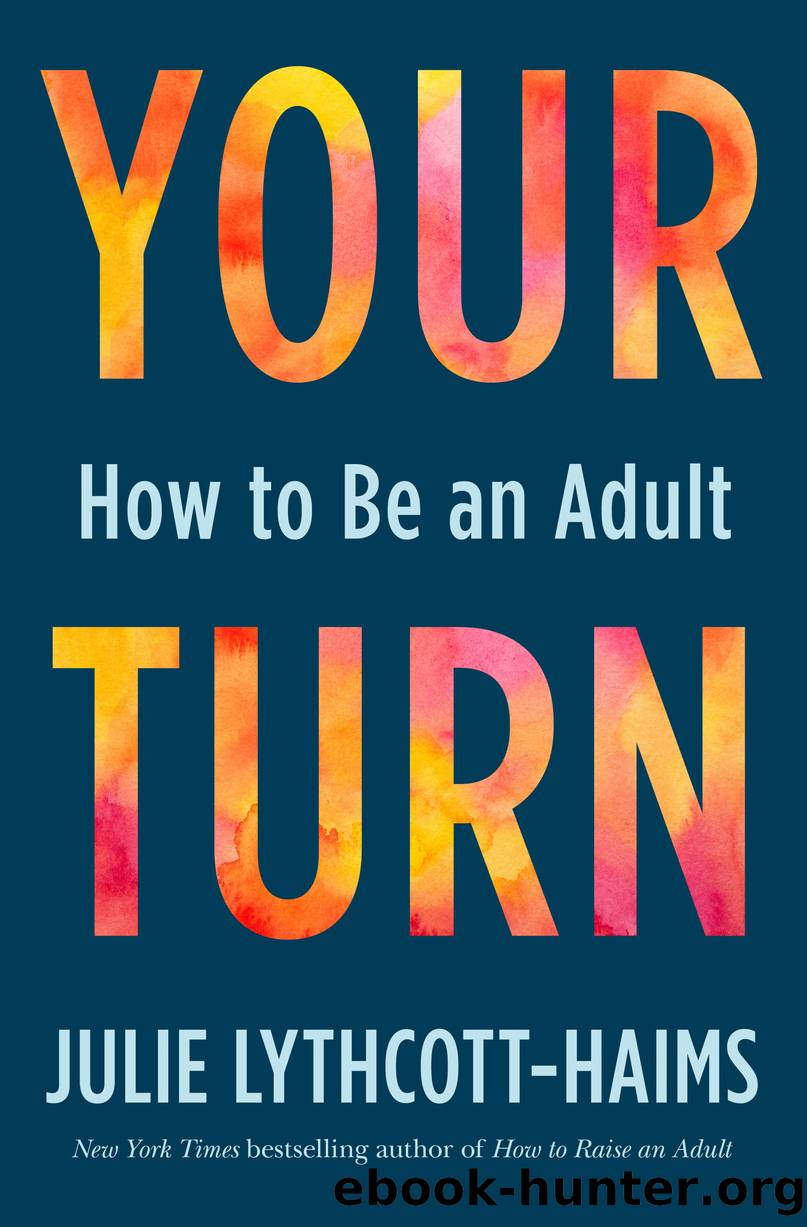Your Turn by Julie Lythcott-Haims

Author:Julie Lythcott-Haims
Language: eng
Format: epub
Publisher: Henry Holt and Co.
ITâS ONLY MONEY, SO WHY AM I CRYING?
It doesnât seem like it necessarily should, but money brings out our emotions, sometimes to a surprising degree.
What we first knew about money came straight from our parentsâ or guardiansâ behaviors and attitudesâhow they took care of the basics like food, rent, utilities, and medical care (or didnât); their attitude toward material possessions; whether they gave way to the impulse of the moment or refused to buy anything they deemed unnecessary; whether they could be transparent about purchases or felt the need to hide them; whether one parent needed permission from the other to spend; whether money led to fightsâthese memories form the soundtrack that plays in our mind whenever we start thinking about money.
Then we overlay our own attitudes and choices about money on top of all of that stuff from childhood:
Am I spending my money on the ârightâ things (and who decides?)
Do I have credit card debt, and how do I feel about all of those purchases?
Did I fund school with student loans, and do I feel good about that investment or do I regret it?
Am I opening my bills (not to mention paying them) or does it scare me to do so?
Is my career choice âworth itâ whatever that means (and who decides)?
Doesnât my education mean I should understand money better than I do?
Do I trust my significant other with financial decisions?
Am I using money as a way to demonstrate my worth?
Am I being taken advantage of by this seller? By this friend?
Am I okay with this person sharing expenses with me?
Am I still on my parentsâ payroll and does that feel okay?
Why do I feel guilty about buying something nice for myself?
Iâll admit that money has flat-out made me cry. Mostly when Iâve realized Iâve done something extremely irresponsible or uninformed. I got my first credit cards when I was in college. The banks pretty much lined the hallway of the student union eager to sign up naïve young spenders like me. Not to blame them. Okay, partly to blame them. But I was the one forking over the card at expensive restaurants and in expensive stores for really unhealthy psychological reasons as it would turn outâlike I wanted store clerks and waiters to know that I was not the stereotypical Black person who could not afford whatever they were selling. Very fucked up, I know. Still, regardless of the complex psychological trauma that made me pull out the plastic, I know the responsibility for what went on those cards ultimately lay with me.
I didnât really understand how a credit card workedâthat I should only use it to buy things I could cover with the money in my bank account. I mean, of course, I knew this. But I didnât have a method for tracking my expenses; I relied on just remembering, which proved to be a fallible method. So, when the credit card bill came each month, I was often a little surprised by how high it was, and over the months and years surprise turned into being completely taken aback.
Download
This site does not store any files on its server. We only index and link to content provided by other sites. Please contact the content providers to delete copyright contents if any and email us, we'll remove relevant links or contents immediately.
Effortless by Greg McKeown(1177)
Word Power Made Easy by Norman Lewis(1065)
Beyond Order by Jordan B. Peterson;(1065)
How to Not Die Alone by Logan Ury(834)
Master of One by Jordan Raynor(809)
Chatter by Ethan Kross(801)
100 Things Successful People Do by Nigel Cumberland(800)
So Good They Can't Ignore You by Cal Newport(744)
Lives of the Stoics by Ryan Holiday & Stephen Hanselman(723)
The Art and Science of Results by Joe Vitale(711)
Napolean Hill Collection by Napoleon Hill(706)
Be Your Best Self by Mike Bayer(688)
Kinesic Magic by Donald Tyson(671)
Career Fear (and how to beat it) by Somi Arian(662)
Friday Forward by Robert Glazer(659)
The 7 Habits on the Go by Stephen R. Covey(647)
The Power of 100! by Shaun King(645)
The Practice Is the Path by Tias Little(630)
The Most Powerful You by Kathy Caprino(603)
